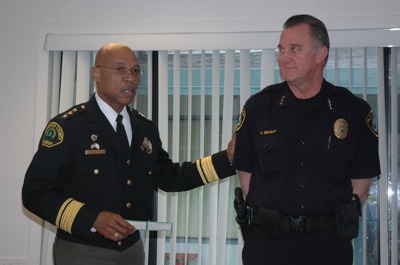SMOKEY POINT — Arlington Police Chief Nelson Beazley and Snohomish County Sheriff John Lovick recently teamed up to talk to seniors about staying safe from fraud and in case of emergencies.
AARP Snohomish County Chapter 2308 hosted the law enforcement duo’s talk at the Stillaguamish Senior Center on April 1 at 1 p.m., during which Lovick warned seniors against dealing with strangers on the phone.
“These phone scams happen all the time,” Lovick said. “They’ll call you late. They don’t care how you feel. Whatever they’re asking you to give your money to, don’t do it over the phone.”
Lovick noted that, even when he solicits donations for causes such as re-election campaigns, he limits his calls to people he knows.
“I have to call people all the time for money, but what I do is call people like Jim who know me,” Lovick said, indicating Jim Cummins of the AARP seated next to him. “If you don’t know the person who’s calling you asking for money, hang up.”
When one senior asked how phone scammers are able to obtain unlisted phone numbers, Cummins explained that such unlisted numbers can be obtained legally under the First Amendment.
“They can buy a whole listing of information on you,” Cummins said. “They only thing they can’t get legally is your political party affiliation.”
Beazley opened his address on the issue of emergency preparedness by joking, “What they didn’t tell me before I moved here was that 50-year floods happen every two years here.”
Beazley passed out cards for the seniors to fill out with the phone numbers of those they would call in cases of emergency, to let others know how they’re doing.
“It helps to preplan these things, because you’re not going to remember them otherwise in the middle of an emergency,” Beazley said. “We’re all going to be very busy then.”
When senior Phil Davenport suggested community checkpoints for events such as earthquakes or other natural disasters, Beazley pointed out that Arlington is already instituting a neighborhood corps program, to break each block into manageably small groups that can look after their own.
At the same time, Beazley warned against expecting phone service to remain intact in case of a disaster.
“We don’t know what could happen to the phone system, given how great the load could be,” Beazley said. “We’ve become so reliant on this technology, and you can see what’s happened in Japan.”
“I had not seen these before, and I’m embarrassed that I hadn’t,” said Lovick as he held a phone number contact card. “I will use this without shame, though. As Gen. Dwight Eisenhower said, the very definition of emergency is that it’s unexpected, and it’s therefore not going to happen the way you’re planning.”







